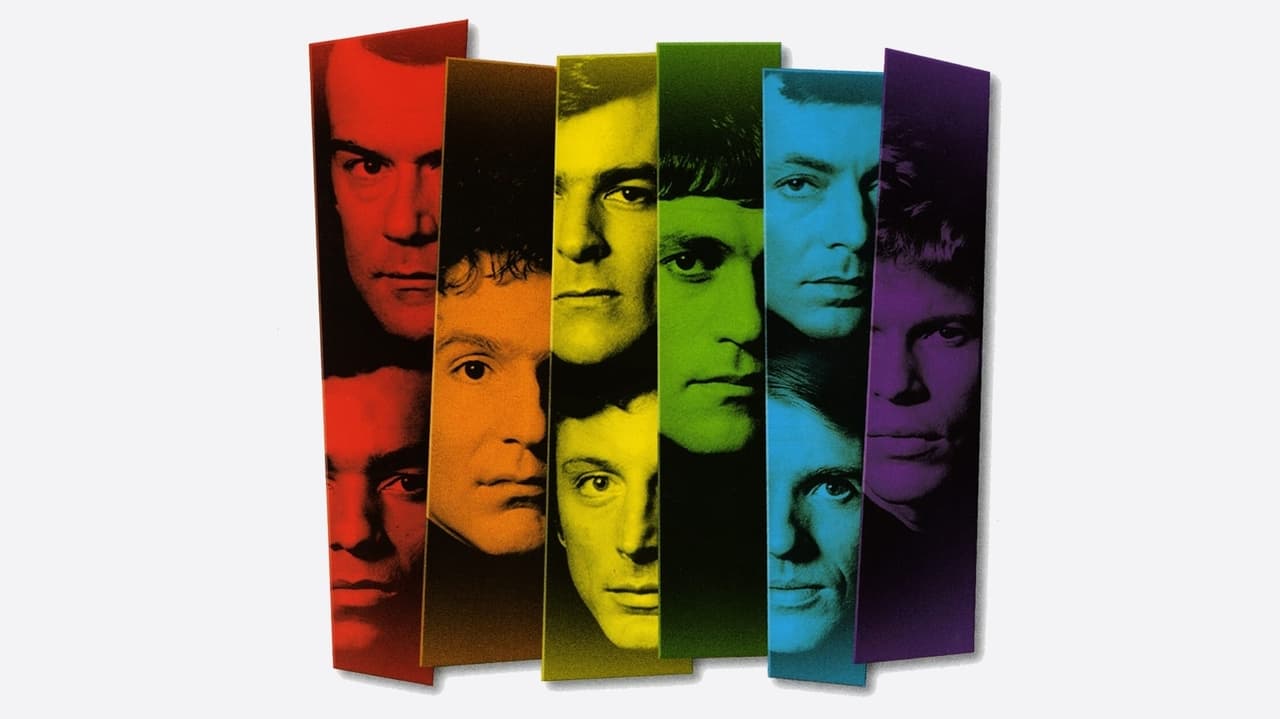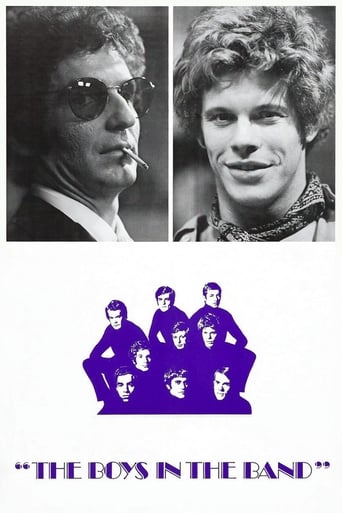

I do not believe one must be a "fan of gay films" to enjoy this movie. This is a movie for anyone smart enough to get it. The setting, the script, the acting - superb. I do not feel, in any way, that this film portrays gay men negatively. I think it portrays gay men in 1970...each with their own personality - men who are gay, but are more importantly friends. This film addressed some heavy issues in 1970 and as far as I am concerned, it was a grand slam. Yes, some characters are funny, brutal, flamboyant, intelligent, reserved, critical, lonely, happy, sad, fun loving, caring, angry...again, these men are individuals who happen to be gay. This is still (after 40 years) a thought provoking film, full to the brim with details - the set, the characters, the "language"...this is a special film.
... View MoreI remember seeing about fifteen minutes of this many years ago, maybe in the late seventies. Back then it had that off-putting unpleasantness that repels you when you're pelted with too much information about people, language and customs that are weird and foreign. At the same time its display of a neat sociological spectrum of gay types was stagy and obvious. I expected things to get a lot creepier kissing, perhaps so I turned it off.I should have left it on because the story is manifestly about universals, not the specifics of gay culture. It gets to this point through a kind of gay over-exposure, and I'll bet the author was keenly aware of how this would deliver the audience to an unexpected destination. The limp-wristed flailing of the queerest character had nowhere to go after two or three cringe-inducing lines, and every possible synonym for gay is flung out for our edification. This seems very dated in its pushiness, but at the same time it quickly brought me the feeling that I sort of knew these people. After cycling through every possible variety of cattiness or kindness between every combination of characters, it finally precipitated a dramatic movement with something important to say.The way it culminated was ingenious and moving, even if I saw it coming about ten seconds before the big gasp. If a clumsy line had telegraphed this event, say, a minute or two too soon the revelation would have been corny. In the theater (which is where I wish I could have experienced this) the immediacy of live actors would likely have prevented even ten seconds of prescience. This moment was the work of a very skilled writer.However, despite its strong resolution, the build-up was awfully repetitive. The bitchy comments were too clever by half, too on-the-nose and too frequent. Even in 1968 a thoroughly gay audience must have groaned at a lot of this.The most dating aspect of this play/film is the absence of any discussion or worry about AIDS. Sex is either flippant or funny or an obvious concomitant of the melodrama of straight sex. It's never scary or foreboding in a life-or-death sense, but only difficult and maddening in a happy-or-despairing sense. Somebody might at least have mentioned the inconvenience of herpes or gonorrhea.The documentary features are excellent. Interviews with Crowley, Friedkin and two actors give a lively historical context to the production of the play and the film. They are honest about the film's outdated aspects but also generously enthusiastic regarding its lasting dramatic and cultural impact.Wikipedia says that five of the six gay actors have died of AIDS, a cruel fact that went unmentioned in the respectful but brief dedications at the very end.
... View MoreA birthday party among gay friends turns into a harrowing emotional experience. Writer Mart Crowley was obviously influenced by Who's Afraid Of Virginia Woolf - a deeper, funnier, and more disturbing play and film.The jokes in The Boys In The Band mostly fall flat, because it's so obvious they were written. The drama is much more effective. Hank and Larry have a realistically complex relationship, and their turn at the game of "telephone" is the film's most moving scene. And the prototypically acid-witted Harold could easily have been a caricature, but somehow Leonard Frey makes every bon mot and theatrical gesture come from a genuine place.Speaking of theatre, I rarely forgot that this film was based on a play, but that didn't prevent it from being engaging. Director William Friedkin is in large part responsible for this. His judicious decisions throughout - from well-chosen reaction shots to a good sense of dramatic timing - facilitate the viewer's emotional involvement.The Boys In The Band has been controversial among the gay community for portraying gay men as psychological disasters. I think this criticism is invalid. First, only one character (Michael) is a true mess. The problems of the others are more ordinary in nature. Second, it happens to be true that being gay is damaging, because from birth, we are taught that homosexuality is wrong. Even if no one says that in so many words, homophobia is impossible to avoid. It's been deemed acceptable behaviour for so long that it's become subtextual in everyday life. This leads to the self-loathing depicted in the movie, and to its too-baldly stated message: "If only we could just not hate ourselves quite so very much."
... View MoreI've just seen the movie for the first time ever (I'm a 20 year-old student) and, as a young gay man who's also very interested in gay movies and gay history, I thought it was extremely interesting. This is a personal analysis of three aspects of the movie - it is not a summary or a complete review. I think that this movie has been vilified without much reason. Yes it shows self-hatred, but only to denounce it. I think that the way it was reviled in the post-Stonewall era is a sign that the movie hit too close to home for many at the time (which is understandable). No one likes to have their own flaws reflected to them too clearly - an issue the play also addresses... For me it was also a matter of saying "this is what you are - change it", which was taken as provocation in the gay liberation movement of afterward. It is, after all, the point of much of the cruel exchanges between Michael and Harold: Telling the horrible, cruel truth to make the other one react. For me, in context - and I strongly advise to read the wonderful "Celluloid Closet" by Vito Russo (or at least see the filmed version that was made) - it *is* indeed a breakthrough movie. It shows a bunch of gay men, who are friends. Gone is the vision of the lonely closeted suicidal queer. Maybe these people are not totally happy, maybe they drink too much, maybe they snap at each other, maybe they're not automatically out and proud but they're not alone. They have friends that stay with them through the hardships, friends that forgive and forget, and they have a sense of community. I'm 20, living and 2008, and still this is something that I can identify with. 40 years after, this is something of the gay community that has survived. And that this film shows it is immensely important. Another terribly interesting topic that has to do with gay life and is both contextual and still relevant today is the relation with the straight world. The straight world, that does not always understand the gay world (the taxi driver, the deliverer) and even scorns it (Alan, the woman on the street). To me, the way Michael immediately goes back in the closet when Alan comes is extremely important. He respects this "very close total stranger" more than his friends at first - he's more concerned with the straight man's comfort level than his friends'. But when Alan disses them, (concerning Emory mostly) Michael defends them. He is still ashamed, but he is adult enough and self-accepting enough not to pretend anymore. This relation of the gay world to the straight world is still a riddle for us in 2008 - how to behave "outside", who to tell, who to hide from, how to handle these colliding worlds, the private from the public, and so on? The question is not dated, and the answer of the play isn't either. The final topic that I want to talk about is the friendship theme. As I've said, there is this group of friends. But more precisely, there is an important triangle: Harold/Michael/Donald. Are they simply friends? Were they lovers? Are they still f**k buddies? Who are they, who were they, who do they hope to be? I do not subscribe to the idea of a love/hate relationship between Michael and Harold. For me, they do not hate each other. They love each other (Michael organizes the party, gets a personal gift... the glances etc.). But Harold becomes harsher with Michael when the latter begins to drink and becomes hostile. It is a way of keeping him in control, and still not wanting to spoil the party. Harold would have been very mean, he isn't, he plays it cool. Michael becomes drunker and drunker and meaner and meaner. But, after all is said and done, Harold lets Michael know that he will still be there in the morning. Donald on the other side is the archetype of the ex-lover/best friend/ future boyfriend(?). It is very common in the gay world to have for best friend an ex-lover, an old flame or an ex- boyfriend (sometimes of a long-term relationship). Gay friendships are often sexually ambiguous - such is Donald and Michael's. Everyone thinks they're lovers, Michael makes sure that Donald feels "settled" and that the Saturday night thing is a fixture (the toothbrush, the question in the end). And Donald is the only one other than Harold that Michael doesn't touch during the telephone game, and the only one he doesn't harm and doesn't attack during the night. They share an intimate relationship, and Donald plays the support role for Michael, without being judging like Harold. And he is there in the end, non-judgmental, still committed. In conclusion, yes this film is cruel, yes it may be disturbing, but it is also witty, hilarious and, for me, full of hope. It is a strikingly real portrayal of gay relationships, of the gay family, and even some things have changed (the self-hatred, mostly), it is incredibly modern in the issues it deals with (coming out, the straight world, friendship, the community, homophobia...). It is a must-see for any gay person.
... View More